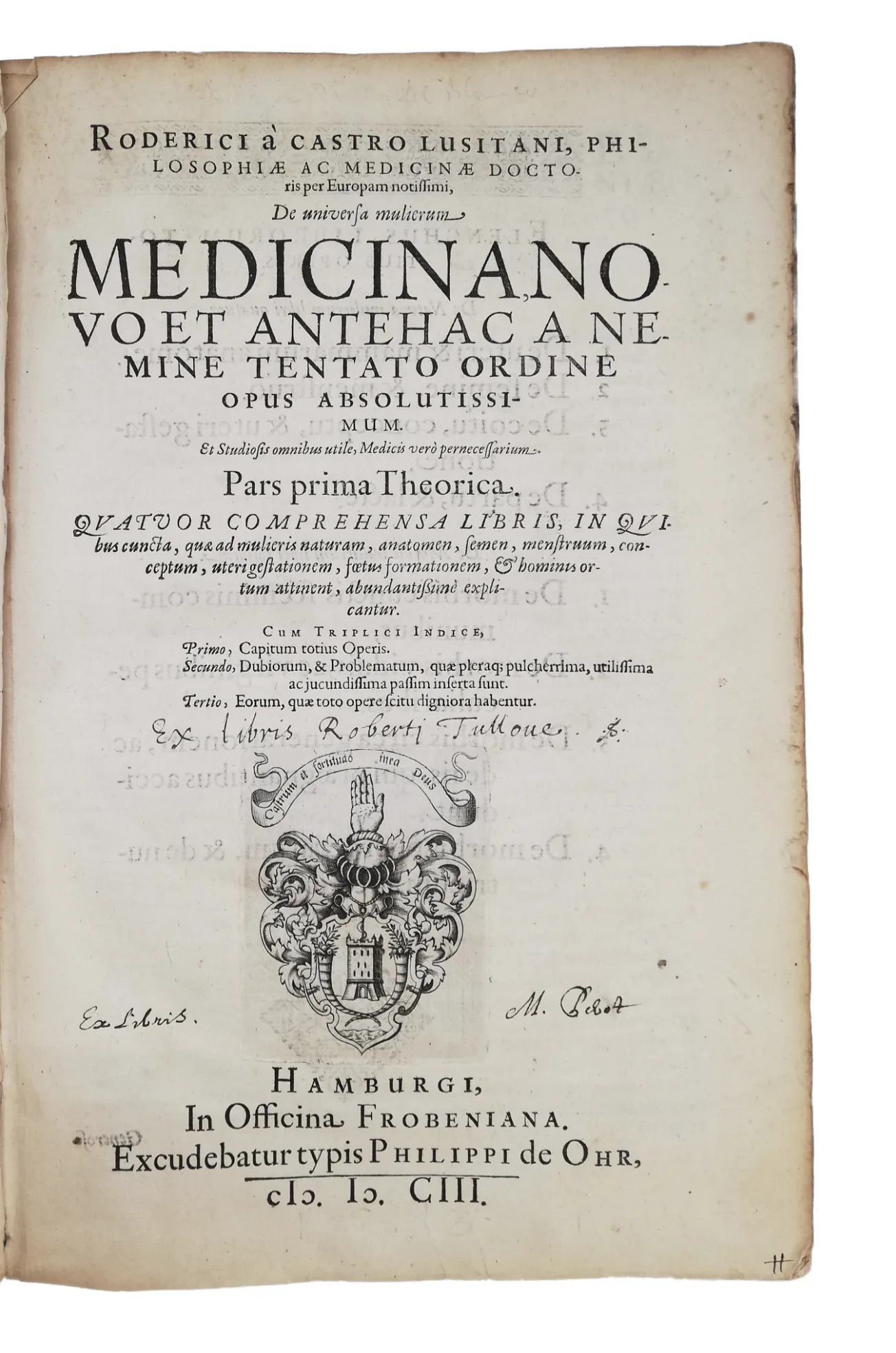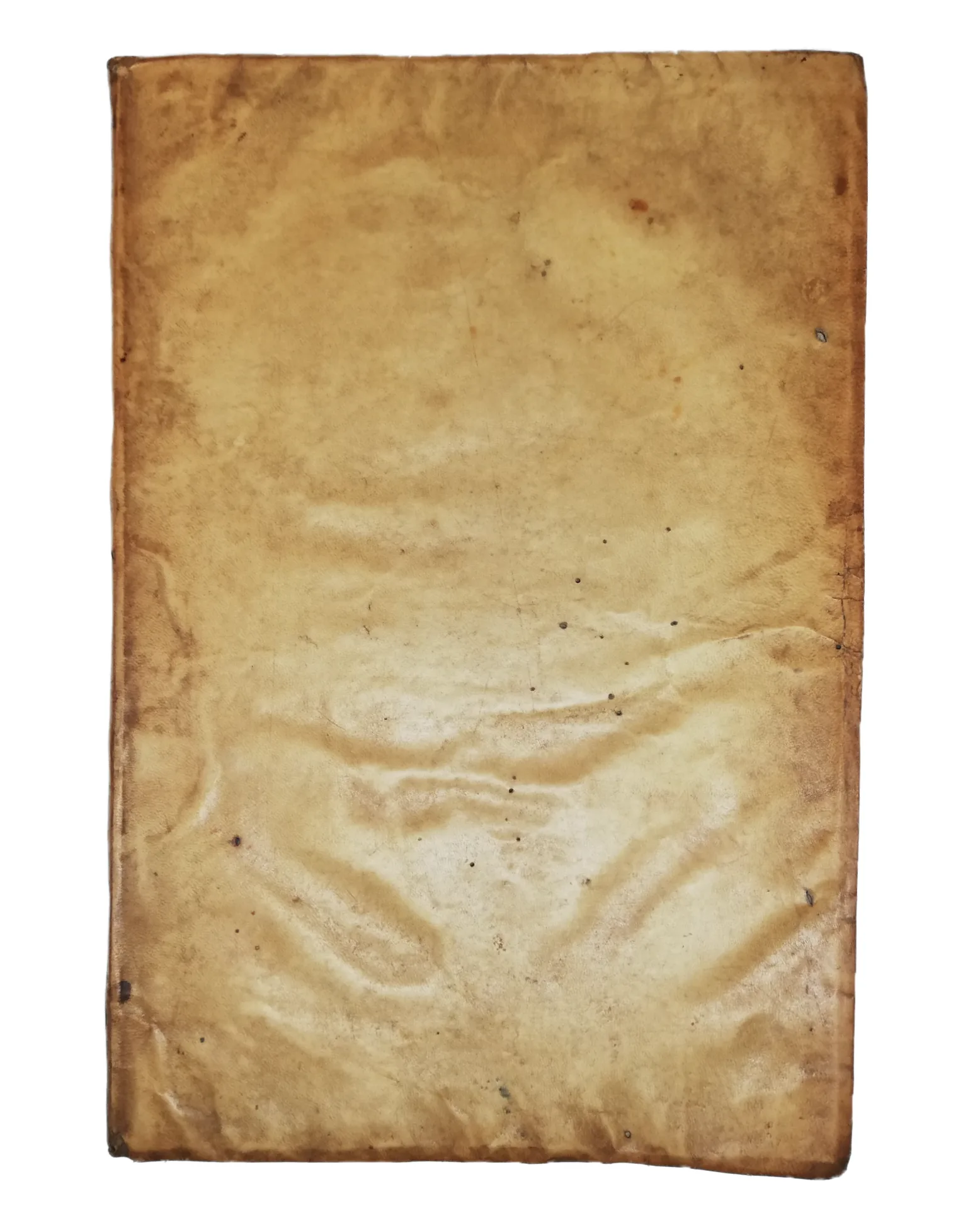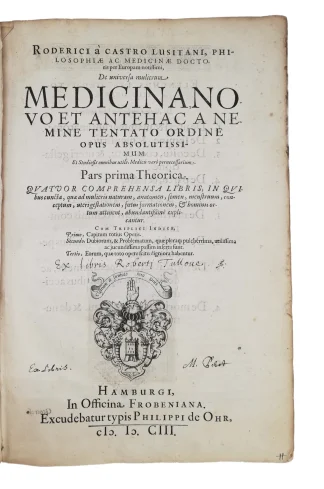CASTRO, Rodrigo de.
WOMEN’S MEDICINE
De universa mulierum medicina […] pars prima theorica – pars secunda, sive praxis.
Hamburg, in officina Frobeniana, 1603£3,750.00
FIRST EDITION. Folio, 2 parts in one, separate t-ps, pp. (xii) 135 (xxi); (viii) 333 (xxiii). Roman letter, woodcut floriated initials, typographical ornaments, headpieces, tailpieces. General light age browning (poor quality paper), intermittent foxing, mainly marginal, occasionally heavier, oil stain to inner margins of a couple of central gatherings, minor tear to one blank lower outer corner, narrow worm trail to outer blank margin of a few ll, flyleaf almost loose. A good copy in contemporary limp vellum, missing ties. Contemporary ms. “Ex libris Roberti Tullone” and slightly later “Ex libris M. Lebot” to first t-p.
A good copy of the first edition of this very successful treatise in two volumes on female anatomy and diseases, by the Jewish physician de Castro. Remarkably, this is the first treatise on this topic ever written by a Portuguese author and it is “generally regarded as having laid the foundations of gynaecology as we know it to-day” (Roth).
Rodrigo de Castro (c. 1546-1627), was born in Lisbon into a well-off family of ‘conversos’, meaning that its members had Jewish origins but converted to Catholicism. Several of his relatives were physicians of some reputation, and de Castro was the most distinguished. After completing his studies at the university of Salamanca, he practiced in Lisbon and then spent time in the East indies researching medical herbs. Due to growing inquisitorial pressure, de Castro later moved to Antwerp and finally to Hamburg in 1594, a significant refuge for Portuguese Jews. Here, his medical reputation grew, and his clientele included the king of Denmark, the landgrave of Hesse, the count of Holstein, and the archbishop of Bremen. It appears that De Castro eventually reconverted, or avowed himself a Jew, as in 1612 his name was included in the list of Hamburg’s Jewish community and was buried in the cemetery of the Jewish-Portuguese congregation at Altona.
‘De universa mulierum medicina’ is de Castro’s most famous and important work, possibly influenced by the premature loss of his first wife, who died in childbirth about 1602. De Castro “denounces the sixteenth century collections of medical texts on women ‘Gynaecea’ as ‘an amalgam of excellent doctrine and wild speculation which could easily mislead students of medicine’” (Maclean) and defines his new treatise as “useful to all scholars, but absolutely necessary to physicians”. It is composed of two volumes, both containing four books. The first, ‘pars prima theorica’, is theoretical in nature and deals the anatomy of the uterus and breasts, menses, conception and pregnancy, labour and breastfeeding. The second, ‘pars secunda, sive praxis’, is more practical, and it is dedicated to women’s diseases, starting from those common to all, moving on to those affecting widows and virgins in particular, those connected to pregnancy, and finally those wet nurses and women in childbirth may suffer from. “Evaluating the classical and Arabic heritage – Hippocrates, Aristotle, Pliny, Galen, Averroes, Avicenna – Castro established a complex dialogue between the traditional ideas of the past and the authors of his own time […] such as Amato Lusitano, Luis de Mercado, Martin Akakia, Ambroise Paré, François Rousset and Girolamo Mercuriale” (Pinheiro)
“Robertus Tullone” might correspond to the French ‘Robert Tullon’. A certain Robert Tullon, Doctor in the Faculty of Medicine, is mentioned in two receipts dated 1664 and preserved in the Archives Nationales de France (Minutes et répertoires du notaire Jean Guillot, 28 février 1662 –
24 mai 1668, étude XCVII).
In stock








